It Rained
It rained. On Thursday, December 11, 2008, it rained. We didn't pay it much attention. After all, it was just a steady rain. Oh, maybe there was the small observation that we haven't had much rain lately. But it was more a wet annoyance than anything else.
I went to dinner with a group from work that night. End of the year celebration and all that. We had a great time with food and drink, without giving the weather a second thought. When I neared home around 8 or 9pm I noticed the temperature was dropping, and some small branches were down on the back roads near my house. Didn't think much of it though. Just some crap in the road. Not all that unusual.
But the temperature continued to drop.
The lights flickered several times around 10pm. I knew what was coming. Well, I knew we would lose power; I really had no clue what was coming. No clue at all.
The power was still on when we went to bed around 11pm. Shortly after the trees started falling. No, falling isn't the right word. Shattering is more like it. SNAP. CRACK. A frightening sound, when a tree branch shatters under the weight of all that ice. Think of the sound of a baseball bat shattering upon impact with a fastball down the middle of the plate. Now amplify that up to the size of a tree.
Did the power go out before we started hearing trees shatter, or after? I don't know. The sequence is lost in the dreamy drifting in and out of sleep of that night. But I do know that the trees continued to shatter. All night long.
The World Is Ice
Morning comes. No power. Outside, ice. Everything is covered with ice.
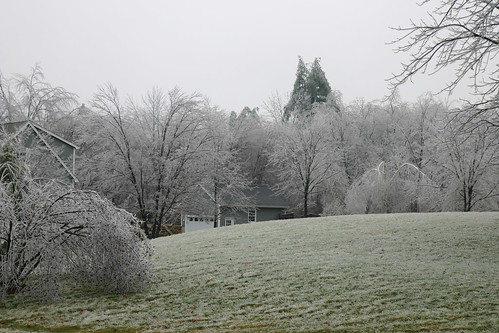
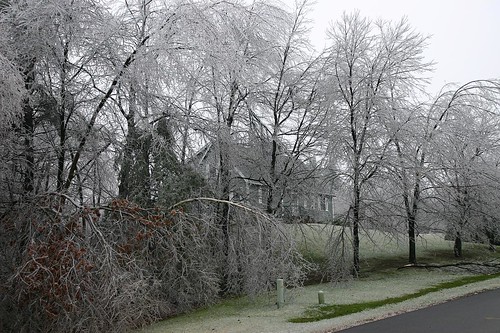
The trees are bending to the ground in submission. And the world is oddly black and white, as if the ice has sucked the color out of everything.
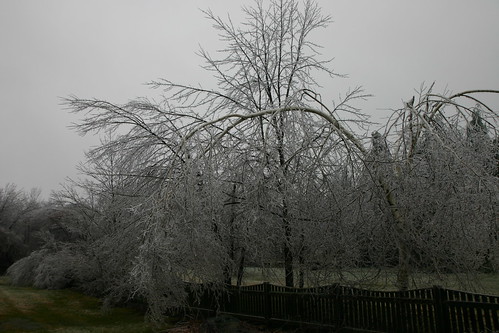
And destruction. Holy crap. There was a war, and the trees were bombed. Thirty, forty, fifty feet up they snapped and shattered.

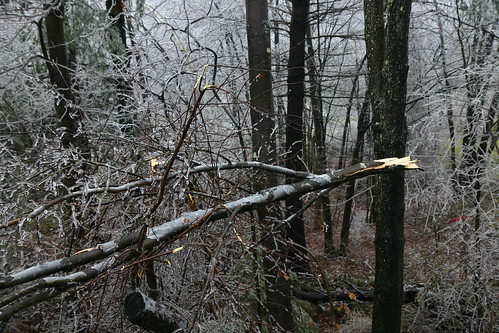
Many small trees didn't stand a chance.

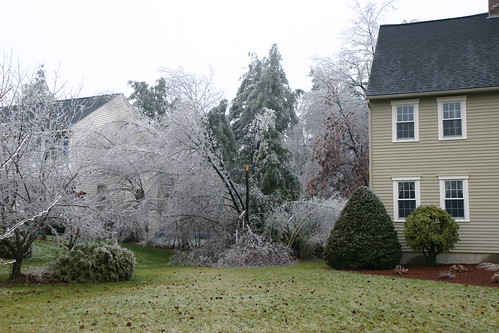
It doesn't take a genius to understand that travel will be treacherous. Roads will be blocked.
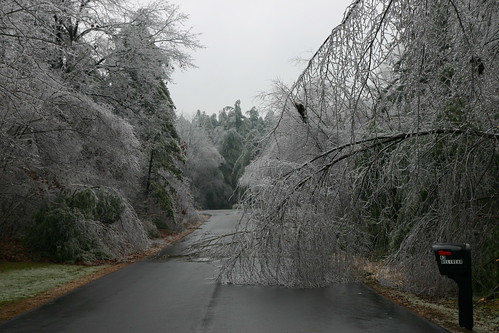

There Is No Power
The numbers are old news by now. What was it, somewhere north of one million people without power in the five northeast states? In New Hampshire alone, almost 400,000 were without power. Even today, almost two weeks later, there are about 2,000 poor souls who haven't been restored. Public Service of New Hampshire (PSNH) reports that it has restrung more than 120 miles of power cable, replaced more than 250 broken poles, 16,000 fuses, and 1,500 transformers. They don't do that in an entire normal year, no less in a couple of days. But the numbers alone don't tell the story.
We started preparing that first day long before darkness took over. Emergency lanterns. Mag lights and other flashlights. Batteries. The emergency supply of water from the basement. The emergency one-burner butane cook stove. Inventory of easy to prepare food. Check. Check. Check. Check. Check. And check. Surely the power will be back on soon, but these are the necessary steps you take when you lose power during winter in New England.
We ventured out in the afternoon. The Shaws grocery store in Derry was open and operating under emergency power. What an odd experience. A bare minimum of dim emergency lights. All of the open cold cases, normally stocked with milk and OJ and eggs and meat, are empty and dark; all of that stuff was evacuated to power-safe locations in the middle of the night. The freezer aisles are still stocked, but blocked off to prevent anyone from opening the case doors and letting the precious cold air out. The water aisle is pillaged, but we score some; without the ability to run our well pump, we are entirely dependent on our emergency supply. Tuna fish and canned soup are gold.
By 3pm we worry about the house getting cold. Our friend, Mark, is our lifeline. Mark heats with a woodstove, and he stockpiles wood on his property the way a squirrel prepares for a long winter. We can use our fireplace woodstove insert as an emergency heat source. It isn't nearly as good as an honest-to-goodness wooodstove, but it will keep the house out of the danger zone. After a trek to Mark's to bring home two recycling bins of wood, the stove is generating heat. Patti and I laugh when I go to plug in the woodstove fan power cord. D'oh! But soon the living room is above 60 degrees F.
Without the ability to circulate heat out of the woodstove via its fan, we burn wood at probably four or five times the normal rate. Mark is a trooper, though, and he keeps us supplied. We average two to three bins a day, with the living room hovering around 60. Rooms further away are down to 50. The basement is 45. The pipes won't freeze. We are thankful. Monitoring the temperature becomes a fundamental activity, particularly when the outside temperature drops into the mid-teens on Saturday night.
In all, we were without power for eight and a half days. They were exhausting days. Our supply of water, batteries, butane, and wood become our primary focus. We sleep in sleeping bags on the living room floor, near the woodstove. Sure as hell can't sleep on our now stone cold waterbed, much to the dismay of our cat.
The house is a wreck. Everything is dirty. Between the dirt from burning wood, and conservation of our bottled water supply, daily activity clean up is nowhere near normal. I wonder, what did the pioneers ever do without Clorox Wipes?
We may be running out of clean clothes, but showers at work are a blessing.
Our cat, GK, a creature of habit if there ever was one, is freaked. He has this look that says, "SRSLY, WTF?"
The tropical fish tank water temperature is well below the safe zone. The neon tetras are dead within three days, but Pleco the plecostomus hangs in. He's got a lot of body mass, and he appears to go into a state of semi-hibernation. We establish a pattern of filling the tea kettle with bottled Poland Springs water, heating it on the wood stove, and using it to bring the water temperature up a few degrees. We don't really know if it helps Pleco at all, but it makes us feel better.
We emptied both refrigerators, as well as the upright freezer, on Sunday afternoon. It started when we noticed a puddle of water under the fridge in the kitchen. Sh*t, there goes a whole bunch of food. But at least we have curbside garbage pickup, and tomorrow morning is garbage day. All three appliances are spic and span. Better to do it now, before it becomes a battle against rotting smell.
The sound of portable gas generators fill the neighborhood, but we don't have one. People wait in lines at Home Depot for daily shipments.
Eight long days of this. Sure, going to work helps. But we're distracted, and tired, and scattered.
Twitter Shines Brightly
Coming home after work at night was the most difficult. It would be all too easy to let depression get the better of you. You drive toward your home, seeing houses and neighborhoods brightly light with restored power. But as you near home it all goes dark, except for the dimmest of lights coming from houses with generators. You wander around the house with a headlamp and a flashlight, feeling like a stranger. It's your house, but it isn't home. (Credit for that last line goes to my friend Carolyn. Actually, her exact words were, "Impossible to explain being a refugee in your own home... you just want to go home, but you're already there, and it's not home." Exactly.)
Our twitter community kept us sane, though. Patti and I both have lightweight twitter clients on our smartphones, and the ability to stay in contact became far more important than I would have thought. Some of it was the solidarity (misery loves company?) among the many of us without power. We stayed in touch, and rejoiced when one of us was restored. We were warmed by invitations to come to friends' houses. We were touched by expressions of concern from those near and far. And we were able to shout out to the world; twitter became a cathartic outlet. I smile looking back at my twitter stream. Just a few posts:
Sunday night: have another guinness. throw some more wood in the stove. fall asleep reading in the dark, with cat on lap. my house. tonight.
Monday night: one of our 6 volt battery lanterns hit the too dim stage. OTOH, i scored D batteries today. we measure quality of life by batteries & water
Tuesday: PSNH told my neighbor "maybe Thurs, Fri, or Sat. But maybe next week." Translation: we dunno
Tuesday: Score! 2 butane fuel cartridges and 2 6 volt lantern batteries at Ace Hardware in Concord, MA. Living high on the hog tonight!
Wednesday morning: a hot cup of freshly brewed coffee and the morning paper bring a sense of normalcy
Wednesday night: I know! Let's sit in the dark and read by flashlight! <sarcasm>Again.</sarcasm>
Thursday: at first those PSNH restoration estimates seemed so full of progress and hope. now they just seem like taunts, don't they?
Friday morning: Day 8 begins. PSNH telling us there are only 30,000 customers to go does not bring joy. Where is my fricking power?
Friday afternoon: When I woke up this morning I wondered what would come first - restored power, or the snowstorm? Yea, you guessed it. The snowstorm is here
Friday night: Dear Santa, All I want for Christmas is for MY FRICKING POWER TO BE RESTORED AGAIN. Yours truly, Tommy
Saturday morning: Day 9 of power outage hell begins. Oh boy, I can use snowblowing the driveway as a diversion from my other survival activities.
And then at 11:12am on Saturday: OMG OMG OMG!!!!! WE HAVE POWER!!!!!! WE HAVE POWER!!!!!!!!!!
Beauty
Yea, so the week was hell. But on that first Friday morning I grabbed my camera and walked around. And what I was most attracted to was the beauty of the small, rather than the large. Some examples:
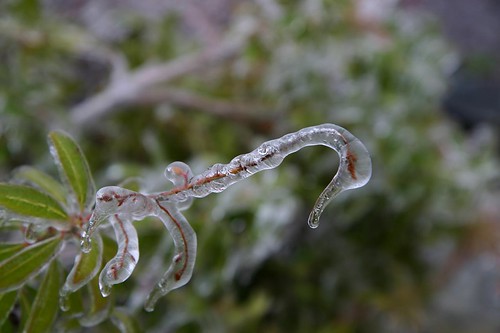

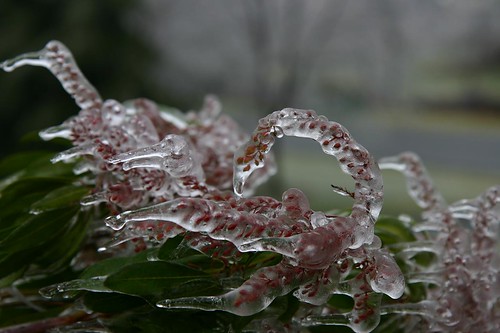
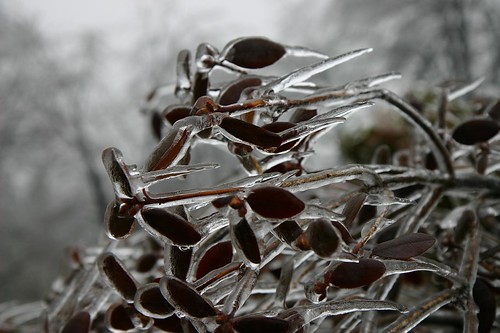
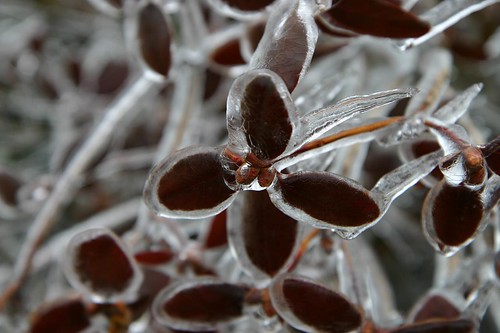
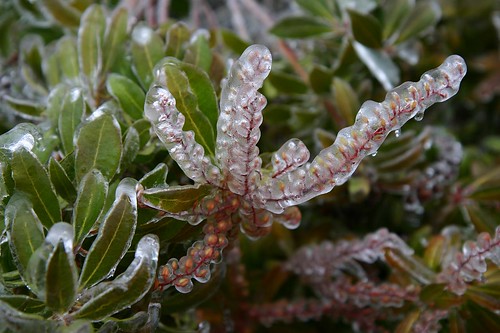
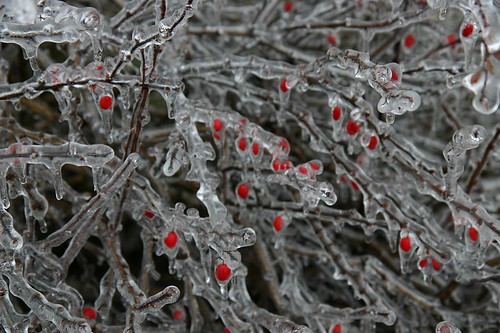

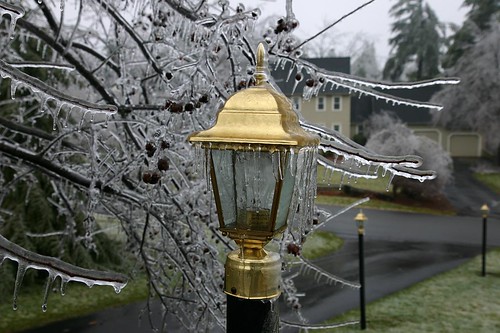
Perspective
Some perspective is called for. My first thought here is that the region got lucky on that first Friday, because the temperature went up to the high 30s rather than the other way. Had the region gone into a deep freeze while all that ice was still in the trees, it would have been far worse; no question. But with higher temperatures on Friday, and the help of the sun, much of the ice melted and set the trees free. As bad as the ice storm and power outage was, New England dodged an even bigger bullet.
And next, really, all this only amounted to a week or so of inconvenience. Sure, we worried about freezing pipes. And chimney fires. And I understand there was at least one death because of carbon monoxide poisoning. And yes, some people had damage to their houses and cars from trees and branches falling into them. But for the vast majority of us in the region, it really amounted to a major pain in the ass. Nothing more.
Not like my former colleague and friend, Lucille, whose house in Biloxi, Mississippi was hit by Katrina. I remember her description of the first floor of her house. She said something like this: it was as if someone had filled the first floor with 6 feet of water...and then turned the blender on.
Or Ellen Isaacs in California. Her description of losing her house in the Ormsby Fire ("solving the mouse problem once and for all") in March 2008 puts our power outage in its rightfully puny perspective.
Within days, heck, within hours, of having our power restored we were back to normal - heat, lights, wireless network, cable, the works. But for Lucille, and Ellen, and thousands more, well, some of them are still putting the pieces back together. So I will count myself as inconvenienced for a week, but very fortunate.
But I sure as hell am getting a stand-by backup generator running on liquid propane. Never again!
